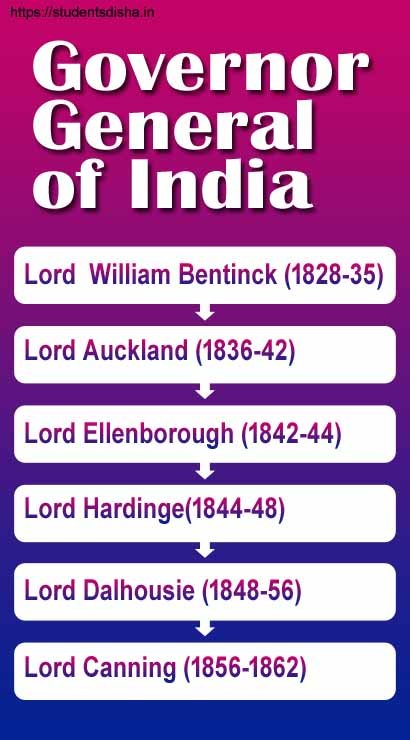Dear Readers, Here I provide all the list of Governor General of India with complete details for Railway NTPC, Group-D, SSC, Banking, State PSU, and all Competitive Examinations. It is one of the important topics in Indian history. Other history topics are Important war/Battle in Indian history, list of Governor-General of Bengal,
Governor-General Of India (1833 Act): Charter Act of 1833 was passed and made lord William Bentinck the first governor-general of India. The Governor-general of India headed the central government of India, which administered the provinces of British India.

Table of Contents
Lord William Bentinck (1828-35):
- He is the most Liberal and enlightened person among all Governor-General of India.
- He is regarded as the “father of modern western education in India”.
- Made English, the medium of higher education.
- Abolition of sati in 1829 and the suppression of thugi in 1830.
- The first medical college was opened in Calcutta in 1835.
- According to the charter Act of 1833, he is the first Governor-general of India.
- Treaty of perpetual friendship with Maharaja Ranjit Singh in 1831.
- Raja of Mysore was deposed and annexation of his territories in 1831.
- Annexation of cachhar in 1834, Jaintia in 1832, and Coorg in 1843 on the charge of Mal-administrator.
- Formation of Arga province in 1834.
Sir Charles Metcalfe (1835-36):
- He is known as the liberator of the press.
- Abolished all restrictions on the vernacular press through the press Act of 1835.
- Passed the famous press law, which liberated the press in India.
Lord Auckland (1836-42):
- First Afghan war (1836-42).
- Death of Rnjit singh in 1839.
Lord Ellenborough (1842-44):
- He became the first Governor-general of India to be recalled for defying the orders of the court of Directors of East India company.
- Abolished “slavery”.
- Sind was annexed by Charles neapier. He was appointed as the first Governor of sind.
Lord Hardinge(1844-48):
- He issued orders for the prohibition of female infanticide and suppression of the practice of human sacrifice among the knond tribe of Odisha.
- First Anglo Sikh war (1845-46) and the treaty of Lahore in 1848.
Lord Dalhousie (1848-56):
- His real name was James Andrew Ramsay.
- Introduced the “Doctrine of Lapse” and captured Satara in 1848, Jaitpur and Sambalpur in 1849, Udaipur in 1842, Jhansi in 1853, and Nagpur in 1854 through it.
- Introduce /opened the 1st Indian Railway in 1853 (from Bombay to thane ).
- He also opened the “telegraph and the postal system in 1853″.
- Widow remarriage Act 1856 passed.
- Abolished title and pensions.
- All ports in India were declared free.
- Established 1st engineering college at Roorkee. So he was called the father of technical education.
- Established a separate public works department in every province.
- Religious Disabilities Act 1856 was passed.
- Woods educational Despatch of 1854.
- Second Anglo-Sikh was (1848-49) and annexation of Panjab.
- The second Anglo-Burmese was in 1852
- Santhal uprisings (1855-56).
- Charter Act of 1853 passed.
Lord Canning (1856-1862):
- Till 1858, he was Governor-General of India.
- He was the last Governor-general of India and first viceroy of India (According to the Government of India Act, 1858)
- He withdrew Doctrine of lapse.
- He opened the universities of Calcutta, Bombay, and madras in 1857.
- Passed the Act of 1858, which ended the rule of east India Company.
- Income tax was introduced for the first time in 1858 by Sir James Wilson.
- High courts were established at Calcutta, Bombay, and madras in 1862.
- Indian councils Act 1861 passed.
- The Indian penal code 1859 was passed.
FAQ Governor-General of India
Q. Who is the first Governor-General of India?
Ans-According to Charter Act 1833 Lord William Bentinck is the first Governor-General of India.
Q. Who stopped the Sati system in India?
Ans- With help of Raja Ram Mohan Roy, Lord William Bentick abolished the Sati system in 1829.
Q. When was Sati Pratha abolished?
Ans- In 1829 Sati Pratha was abolished.
Q. Who known as the “father of modern western education in India”?
Ans- Lord William Bentinck is known as the “father of modern western education in India”
Q. When the first medical college opened in India?
Ans-The first medical college was opened in Calcutta in 1835.
